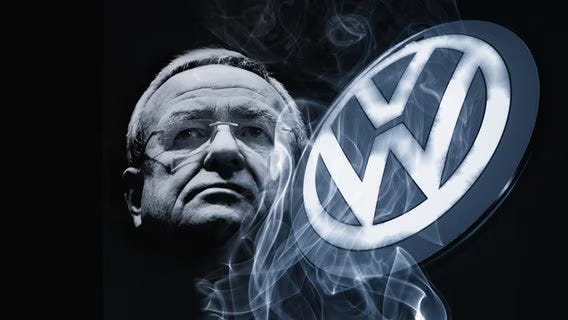Martin Winterkorn on Trial: Revisiting the Dieselgate Scandal
Cracking the Vault: In-depth article
Good morning and happy Thursday.
TL;DR: Former Volkswagen CEO Martin Winterkorn's trial has begun, nearly a decade after the 2015 Dieselgate scandal, where Volkswagen was caught using defeat devices to cheat emissions tests. Winterkorn faces charges of fraud, market manipulation, and perjury for allegedly knowing about the devices and failing to disclose the issue. The trial will last months and will scrutinize his involvement in the scandal, which cost Volkswagen over €30 billion in fines and reshaped the auto industry’s shift towards electric vehicles.
Let’s jump in!
Martin Winterkorn on Trial: Revisiting the Dieselgate Scandal and Its Lasting Impact
The Dieselgate Trial: Martin Winterkorn Faces Fraud Charges
The long-anticipated trial of Martin Winterkorn, former CEO of Volkswagen, began this week, nearly a decade after the “Dieselgate” scandal broke in 2015. The trial is drawing attention due to the severity of the charges and because of it being considered one of the most notorious corporate scandals in modern automotive history. Winterkorn faces multiple charges including fraud, market manipulation, and providing false testimony. To prepare you for what is expected to become a lengthy trial with 89 scheduled hearings through September 2025, this article is aimed at recapping the Dieselgate affair.
What Happened: Dieselgate Scandal Unfolded in 2015
In September 2015, the US Environmental Protection Agency (EPA) publicly accused Volkswagen of deliberately circumventing emissions tests through the use of "defeat devices." These devices, installed in over 11 million diesel vehicles, allowed the cars to pass emissions tests with flying colors by artificially lowering nitrogen oxide (NOx) emissions during laboratory testing. However, in real-world driving conditions, the vehicles would emit NOx pollutants up to 40x the legal limit.
Volkswagen had aggressively marketed its diesel cars in North America, as clean and environmentally friendly alternatives to gasoline-powered vehicles. However, the reality was that the company had been using these defeat devices as early as 2006, enabling its cars to meet emissions standards without sacrificing performance. The revelation shook the company, leading to fines, recalls, and compensation payments costing the company billions.
Why the Trial Now?
Martin Winterkorn, who had been CEO of Volkswagen from 2007 to 2015, resigned shortly after the scandal became public, claiming he was unaware of the cheating. Yet, the trial against him began after years of investigation by German authorities, culminating in accusations that Winterkorn knowingly approved the use of defeat devices and failed to disclose the cheating to regulators and investors.
Winterkorn's charges include commercial fraud, market manipulation, and perjury for allegedly lying to a parliamentary committee investigating the scandal. Prosecutors argue that he knew about the emissions cheating well before the public disclosure and played a role in covering it up. He is the highest-ranking executive to face trial in the scandal, but he is not alone - other Volkswagen employees involved in the scandal have faced legal actions, fines, or jail time.
The Implications of Dieselgate
The Dieselgate scandal rocked the automotive world, severely damaging Volkswagen’s reputation and shaking confidence in diesel as an environmentally friendly fuel. Volkswagen admitted guilt, paid over €30bn in fines, compensation, and vehicle recalls, and faced lawsuits across the globe.
It also served as a catalyst for a shift in automotive policy, accelerating the move toward electric vehicles (EVs). Volkswagen redirected its strategy toward electric mobility as the scandal became a cautionary tale for automakers about regulatory compliance and the risks of prioritizing profits over sustainability.
What to Expect from the Trial
Winterkorn’s trial is expected to last months if not years, given the complexity of the case and the extensive documentation involved. Prosecutors will likely focus on whether Winterkorn had direct knowledge of the defeat devices and if he deliberately misled authorities and shareholders. If convicted, he could face a lengthy prison sentence and further fines.
One key aspect of the trial will be how the defense frames Winterkorn’s role. His legal team asserts that he was not involved in the decision to use defeat devices and that he did not intentionally mislead regulators or investors. This will likely be a contentious point throughout the trial as the prosecution presents internal documents and testimonies from insiders.
Broader Context: A Struggling Volkswagen and the Future of Diesel
The trial comes at a time when Volkswagen is facing other significant challenges, including falling profitability and increased competition in the electric vehicle market. The company is also dealing with potential plant closures in Germany, partly driven by its sluggish transition to EV production, EV software issues, and a slower-than-expected EV adoption rates. These broader financial and operational struggles contextualize why the Dieselgate scandal, though nearly a decade old, continues to resonate.
The trial against Winterkorn serves as a reckoning for past corporate wrongdoing and underscores the challenges facing Volkswagen as it seeks to regain customer trust and reposition itself in an increasingly electrified market.
In conclusion, the trial of Martin Winterkorn is a significant legal and symbolic event that highlights the lasting impact of Dieselgate. It is a moment of accountability for Volkswagen’s leadership, whose decisions during that critical period still reverberate throughout the automotive industry today. As the trial unfolds, observers will be looking for answers to whether Winterkorn was indeed the mastermind behind the emissions scandal or simply the fall guy for a corporate culture gone awry.
Until next time, stay curious!



